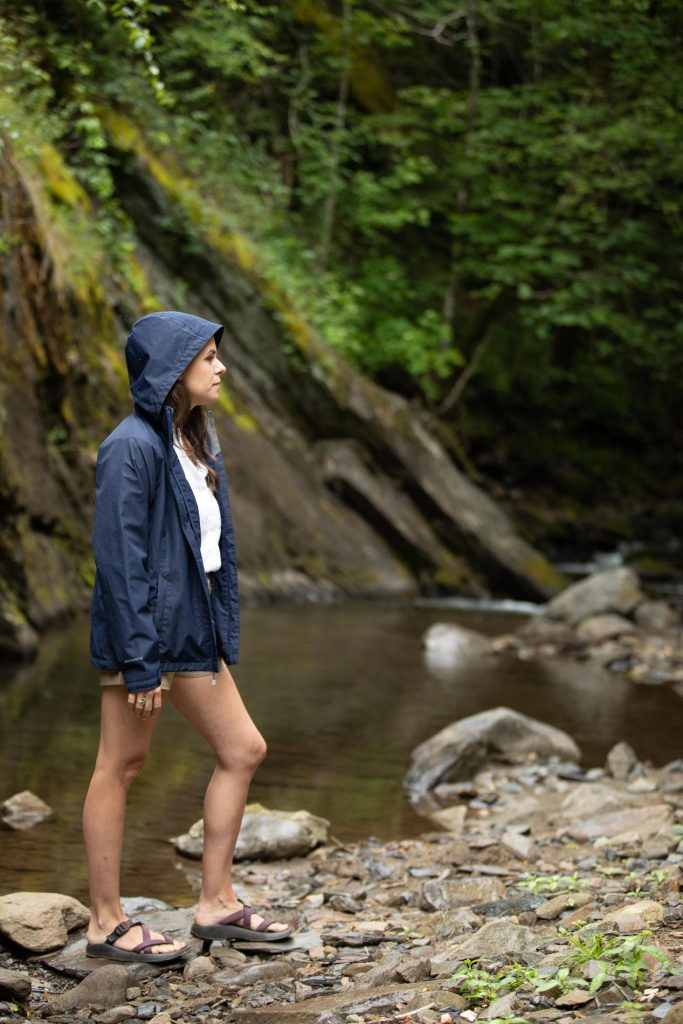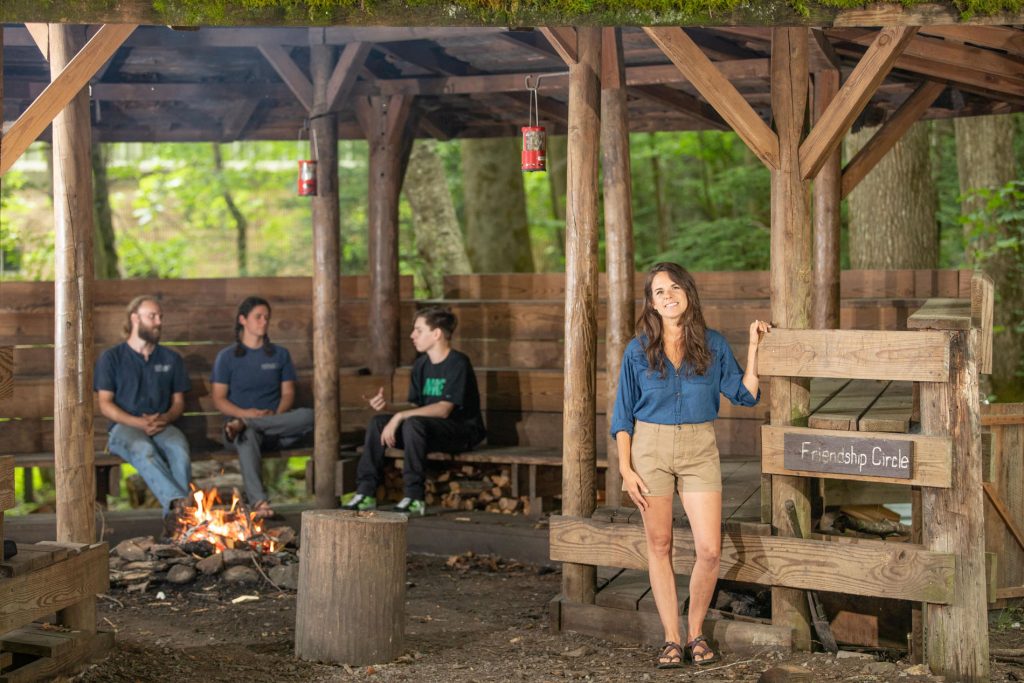Smokies’ center inspires curiosity about the nature that surrounds it
The Great Smoky Mountains National Park in our backyard isn’t something to take for granted. Its landmarks and vistas challenge and inspire us. One such landmark is the Great Smoky Mountains Institute at Tremont, a nonprofit which hosts environmental education programs for children and adults. Though COVID-19 has dealt a blow to its programming and budget, the institute’s vision for its future will challenge others to think about their impact on the world.
Tremont’s History
The known history of this beautiful section of the Smokies stretches back almost 200 years. The land was settled by Will and Nancy Walker in 1859 and saw several transformations through the years. Tremont was officially established as a logging town in 1926, and then a mere eight years later, the Great Smoky Mountains National Park was born.
In the early 1960s, a Job Corps center became a part of Tremont. It was an effort on President Johnson’s part to teach young men vocational skills, similar to the Civilian Conservation Corps that existed in the 1930s. The men that participated in the program lived in buildings throughout the Tremont area, and when funding for the program was cut, the buildings were abandoned.
In 1969, Maryville College, in partnership with the National Park Service, opened the Tremont Environmental Education Center—a place where young adults could receive an education on the earth and natural resources, from the earth itself. While the name has changed slightly over years, its mission hasn’t changed.
Tremont’s Mission
The Institute at Tremont’s official mission is to deliver experiential learning for youth, educators, and adults through programs that promote self-discovery, critical thinking, and effective teaching and leadership. This is something that President and CEO Catey McClary addresses every day.
“Many people think of environmental education centers as a place to learn how to identify trees. We do that, but we’re not in the business of teaching about nature,” says McClary. “We’re all about helping people discover their curiosity about nature. It’s about the connection to nature that’s different for each individual. As long as that connection is there, we believe we’re doing important work.”

McClary’s first experience with Tremont was in the sixth grade on a school field trip. That visit to the Institute shaped her dreams, lifelong understanding of the environment and her role in it. After graduating from Appalachian State University with a degree in ecology and environmental biology, she spent 13 years with a nonprofit camp in North Carolina, initially as a counselor and eventually as its CFO. When she heard about the open position at Tremont, she knew it was meant to be. “I get to work with people who go outside and teach people to discover and be curious about nature,” says McClary.
Threats and Challenges
However, this year has posed the same challenges and threats for Tremont’s educational programs that the rest of the world has faced. The institute relies on its public programs and support to continue to provide programming. Perhaps the programs Tremont is best known for are its school programs for kids of all ages. These programs were cancelled this past spring due to COVID-19, and schools are beginning to cancel scheduled visits for next year as well. But according to McClary, the staff at Tremont don’t intend for this setback to slow them down or destroy the institute.
“What we need now more than ever is for people to understand that we are more than a summer camp. We are more than a field trip for students,” says McClary. “Our programs provide students with an opportunity to grow outside together. We hear time and time again about how our programs provide social and emotional learning, how they build critical thinking, how they improve classroom dynamics and build teacher confidence. We need the support of communities to advocate for this type of learning, to share with their school administrators their desire for this type of learning.”
How to Support the Institute
Despite having cancelled their student programs for the summer and fall, families can still access the wonder of the Institute at Tremont itself. Whether you go on a solo hike, or bring family and friends, the Institute’s blog provides fun ideas and resources for making the most of an educational experience in the Smokies. Plan a visit, hike the trails, bring a picnic lunch, and remember why the Institute at Tremont does what it does. The institute also is still hosting several programs and courses for educators and adults throughout the fall.
Teachers are on the frontlines of educating future generations, and the educators who bring their classes to the institute are near and dear to Tremont’s mission and future. Tremont’s Teacher Escape Weekends are an opportunity for educators to network and learn about new or upcoming programs Tremont may have for their students. Teachers have the opportunity to interact with naturalists and learn new ways to teach children about appreciating and exploring all that nature has to offer.
Another option for supporting and staying involved with the institute is through its Southern Appalachian Naturalist Certification Program (SANCP) for adults. This class series is based on the fundamentals of understanding and appreciating the nature that surrounds us. Some of the topics covered are naturalist skills, plants, birds, and ecology. Completing all of the courses in the program provides the participant with a non-credit Southern Appalachian Naturalist Certificate from the University of Tennessee.
A more involved option for nature enthusiasts is Tremont’s Road Scholar trips. This program involves a Sunday to Friday stay at the Institute, daily hikes that range from 5-13 miles, nighttime stories about Appalachia and the Great Smoky Mountains around the fire, and fellowship with other hikers and Tremont staff members.
Most courses and events that are being offered require a registration fee, which goes right back to supporting the Institute at Tremont and its mission to ignite curiosity for nature in people of all ages.

Despite their ongoing programming, McClary says that “the risks the virus has presented our organization has been extremely hard to mitigate. Since March we’ve not received any program income, and we anticipate long-lasting impacts… As such, we’ve made recent cutbacks to our staff to help us bridge the gap in program income. However, we recognize that at a time when our programs are out of reach for so many, they are needed now more than ever before. The respite time spent outdoors is critical for our health — mentally, physically, socially, and emotionally.”
Looking Ahead
Long before the COVID-19 setback. the Tremont board purchased 194 acres of land in Townsend for a second campus. The vision is to build an environmental center that generates, rather than consumes, both water and energy. It will rely on local materials and include an education component to help people understand how they can be better environmental stewards within their own communities. The campus will provide programs for school use but also adult programs and corporate opportunities that employ experiential learning, provent to improve both competency and retention for participants. The capital campaign is still in its early stages, McClary says, and COVID has certainly set it back. But the big and bold vision has not changed. “It won’t be the easy thing to do,” she says. “But it’s the right thing to do.”
